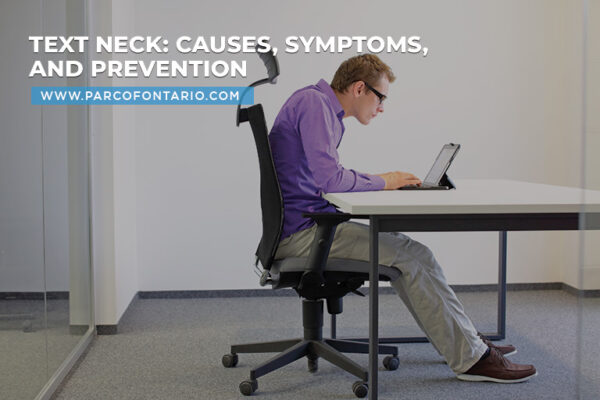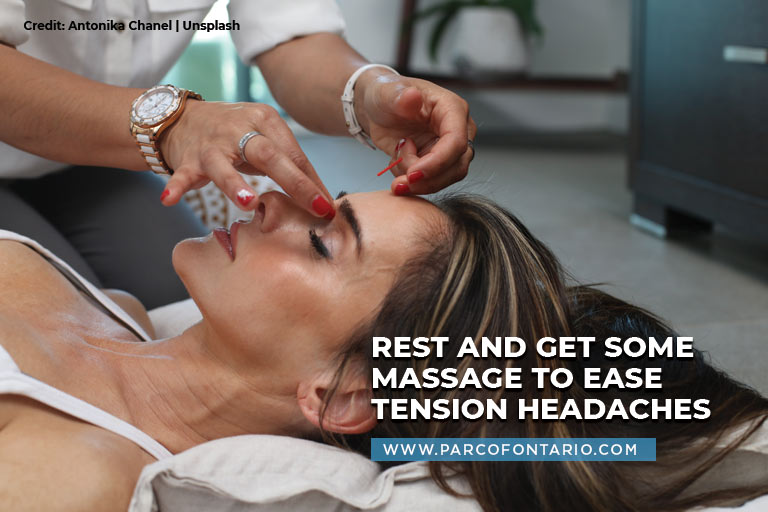
Text Neck: Causes, Symptoms, and Prevention
Many of us spend long hours hunching over our electronic mobile devices and laptops. As we spend more time texting, browsing social media, and reading on our devices, this constant downward gaze…
Read More
Being the most prevalent type of headache, tension headaches are almost universally known for the intense discomfort they bring. This type of headache typically appears in the afternoon and causes mild to moderate pain that may feel like a band of pressure or a dull tightness. Tension headaches occur when neck, shoulder, and scalp muscles become strained or get stressed. For this reason, tension headaches are also known as stress headaches, and are the most common type in adults.
Tension headaches remedies are available. Finding a balance between good habits, finding non-drug solutions that work, and using medications as prescribed is typically key to managing tension-type headaches. Remember these so the next time you ask how to get rid of a tension headache fast, you have an idea of how to manage your headache.
Most people suffering from tension headaches experience them from time to time, but others get them more frequently. Tension headaches are divided into 2 types:
Episodic headaches of this nature can last anywhere from 30 minutes to a week. Frequent episodic tension headaches happen fewer than 15 days per month for at least 3 months. These frequent episodic tension headaches may develop into chronic ones. Furthermore, this kind usually starts slowly during the middle of the day.
Chronic tension headaches can last for hours and can possibly be continuous. This type of tension-type headache happens more than 15 days per month for at least 3 months. These headaches also have a stronger pain intensity than episodic tension headaches.
Tension headaches are the most common type of headache, yet it is still unclear what causes tension headaches every day. And there is no single cause of this type of headache:
Triggers of tension headaches include stress, eye strain, dry eyes, alcohol, fatigue, smoking, cold, caffeine, bad posture, dehydration, lack of sleep, and skipping meals

Common tension headaches symptoms include:

Most people are familiar with the discomfort brought by tension-type headaches. Even when pain comes, the world moves on. Pain may be reduced by medications, but taking care of oneself may be enough to keep getting a headache at bay. Here are some tips on how to relieve a tension headache fast:
Start by drinking more water. Your tension headache may be just because you are dehydrated. So, you might need to increase your water intake.
Try to avoid or limit stressful events. Take time to unwind or do relaxation techniques every day. As long as you regularly practice physical and psychological relaxation therapies, tension headaches can be prevented.
Keep your phone or computer-related activities at a minimum to prevent eye and muscle strain. Take frequent breaks when travelling as well.
Every day, including weekends, try to get up and go to bed around the same time. Relax before going to bed. In the event that you are unable to fall asleep after 15 minutes, get up and engage in some relaxing activities. Prescription drugs with coffee or other stimulants that may interfere with sleep should be avoided. Remember that sleep apnea can also result in tension-type headaches, particularly if you experience headaches in the morning.
Also, try lying on your side or back while using a body cushion to keep your neck in a neutral position.
Your upper back, neck, and shoulders get tense from poor posture, which can result in tension headaches. Usually, the base of the skull is where the pain is felt, but it can occasionally flare into the face, especially the forehead.
Before starting any other activities, posture and ergonomic corrections should be made because poor posture can make exercise less effective. Posture correction will also relieve pressure on some of your muscles, which will lessen headaches.
Exercise causes the body to release chemicals that stop the brain from processing pain signals. Choose exercises you enjoy doing and discuss them with your healthcare provider. They could involve cycling, swimming, or walking. But be sure to take it slow at first. Too much exercise may result in certain types of headaches.
Additionally, to stretch or massage your neck and shoulder muscles, use a therapeutic cane or a hard treatment ball.
Smoke from cigarettes contains nicotine, which lowers blood flow to the brain. Additionally, it causes a reaction in the throat’s nerves. A headache may result from these changes.
Some sufferers of tension headaches have trigger points at the back of their necks or in their shoulders that are extremely sensitive. It may be possible to get rid of the discomfort and stop the headache from happening again by injecting a local anaesthetic into these locations. Additionally, there are a variety of drugs that can help prevent tension headaches. Discuss your medication alternatives with your doctor if non-drug approaches aren’t providing you with the relief you need.
Tension headaches are more than just a health problem. They have a considerable effect on your mental, emotional, social, and financial well-being. Don’t let them interfere with your daily life so go and visit a chiropractor in Oshawa. The Physiotherapy and Rehabilitation Centres (PARC) of Ontario offers therapeutic and rehabilitative exercises to help you with your concerns. Book an appointment now!
Call us or visit our clinic today: